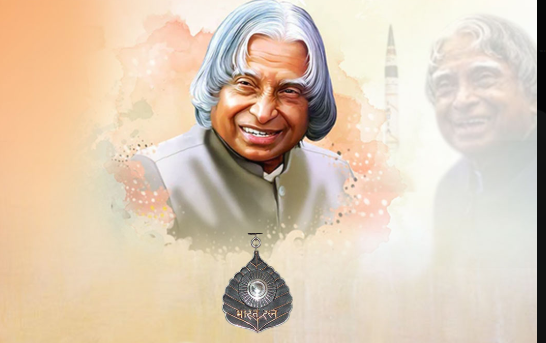
On this day, we remember and honour the extraordinary legacy of Dr. A.P.J. Abdul Kalam — a scientist, visionary, teacher, and the 11th President of India. Fondly known as the “Missile Man of India”, Dr. Kalam’s contributions to the nation’s scientific and defence capabilities laid the foundation for a self-reliant India, decades before the term Atmanirbhar Bharat became a national mission.
From Rameswaram to Rashtrapati Bhavan: A Journey of Vision and Integrity
Born on 15 October 1931 in the small town of Rameswaram, Tamil Nadu, Avul Pakir Jainulabdeen Abdul Kalam grew up in modest circumstances. He was 16 when India gained independence, and 19 when the Republic was born. These formative years—marked by political change and national awakening—instilled in him a deep desire to serve his country, especially in areas of self-defence and technological autonomy.
His life is a timeless example of rising above one’s circumstances. From delivering newspapers to support his family to becoming one of India’s most celebrated scientists and later its President, Dr. Kalam’s journey is rooted in discipline, humility, and service.
The Defence Imperative: India’s Quest for Strategic Autonomy
When India gained independence in 1947, its defence systems were heavily dependent on foreign imports. Through the 1950s and 60s, India relied first on British and later on American arms. However, by the 1970s and 80s, a shift toward the Soviet Union began as India charted its own geopolitical path under the Non-Aligned Movement.
Amidst this evolving landscape, Dr. Kalam emerged as a crucial figure in India’s indigenous defence push. His leadership of the Integrated Guided Missile Development Programme (IGMDP) during the 1980s was a turning point. Under his guidance, India developed the Agni, Prithvi, Akash, Trishul, and Nag missile systems—core to India’s current strategic arsenal.
He wasn’t just building rockets—he was building a resilient, self-reliant India.
From Vision to Revolution: The Kalam Effect on Modern Defence India
Today, India stands on the shoulders of pioneers like Dr. Kalam. Over the past decade, the Indian defence sector has seen unprecedented transformation. Guided by the Make in India and Atmanirbhar Bharat initiatives, India is now on the path to becoming not just a manufacturer, but a major exporter of defence technologies.
-
Defence production has soared from ₹46,000 crore in 2014 to over ₹1.5 lakh crore in 2025.
-
India’s defence exports have jumped from under ₹1,000 crore in 2014 to ₹23,622 crore in 2025, with ambitious goals of ₹50,000 crore by 2029.
-
The private sector now contributes over ₹33,000 crore to defence manufacturing.
-
Programmes like iDEX (Innovations for Defence Excellence) and Technology Development Fund (TDF) are empowering over 650+ startups and MSMEs, fuelling a homegrown innovation ecosystem.
From drones and light combat helicopters to next-gen artillery systems, aircraft carriers, and missile systems, the ecosystem that Dr. Kalam once envisioned in the labs of DRDO is now a roaring engine of national capability.
Quotes That Continue to Inspire a Nation
Dr. Kalam’s wisdom transcended science. His words have become guiding lights for students, entrepreneurs, soldiers, and dreamers alike. Some of his most iconic quotes include:
-
“You have to dream before your dreams can come true.”
-
“If you want to shine like a sun, first burn like a sun.”
-
“Dream is not that which you see while sleeping, it is something that does not let you sleep.”
-
“All of us do not have equal talent. But, all of us have an equal opportunity to develop our talents.”
-
“Man needs his difficulties because they are necessary to enjoy success.”
These aren’t just quotes—they are calls to action, reminding us that greatness comes from courage, perseverance, and purpose.
A Teacher Forever: Dr. Kalam’s Writings and Books
Dr. Kalam remained a teacher at heart. Even as President, he made it a point to connect with students across India. He authored numerous books that continue to inspire:
-
Wings of Fire – An autobiography that captures his early life, education, and work in India’s space and missile programs.
-
Ignited Minds – A call to Indian youth to dream big and transform the nation.
-
India 2020 – A futuristic vision co-authored with Dr. Y.S. Rajan, outlining a roadmap for India’s development.
-
Mission India, Inspiring Thoughts, Turning Points, My Journey, and Transcendence – Each of these books explores different facets of national development, leadership, and spirituality.
His writings are reflections of a man who balanced scientific rigor with deep humanism.
Conclusion: Carrying Forward the Kalam Legacy
Dr. A.P.J. Abdul Kalam left us on July 27, 2015, while doing what he loved most—addressing young students. Even in death, he served. His life was, and continues to be, a shining example of selflessness, dedication, and relentless pursuit of excellence.
As India moves toward 2047, the centenary of its independence, the dream of a self-reliant, technologically advanced, and secure nation is no longer a distant dream—it is within reach. But this dream, as Dr. Kalam would say, must not let us sleep.
Let us honour his legacy not just in words but in action—by believing in ourselves, building for the nation, and dreaming the dreams that transform the future.

